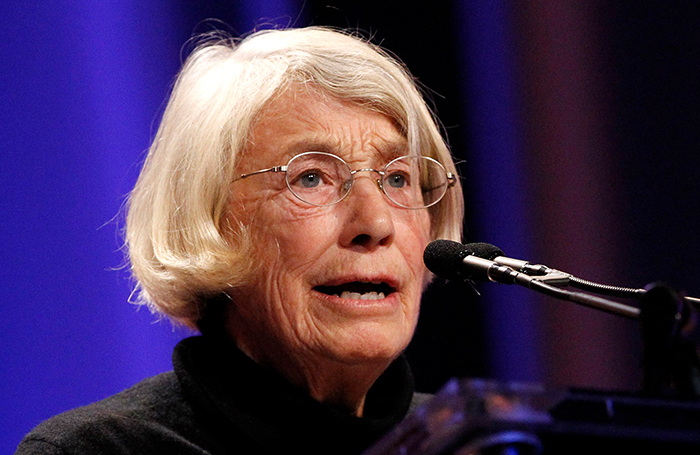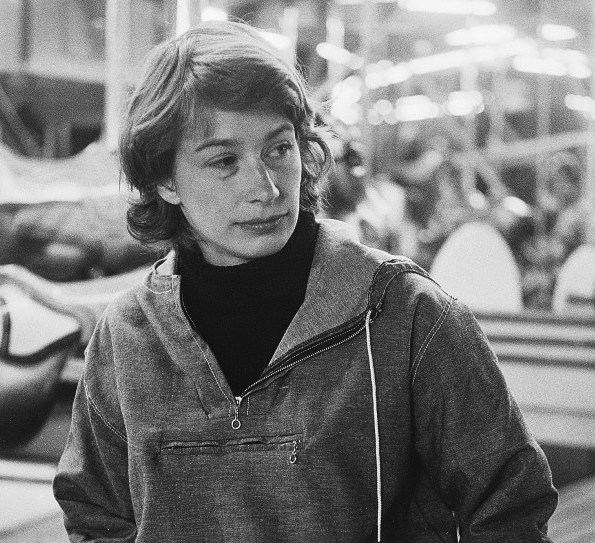News & Views
A Bride Married to Amazement
In Memory of Mary Oliver, poet and mystic — by Kawther Luay

Poet Oliver reads one of her poems during the lunch session at The Women’s Conference in Long Beach. Photograph: Mario Anzuoni/Reuters Pictures
Mary Oliver, a modern mystic, and possibly our era’s most cherished American poet, died aged 83 in her home in Florida on 17 January 2019. She is best known for her compassionate, attentive regard for the natural world, her wide appeal giving her, in later life, a reticent rock-star status. Her poems use uncomplicated language, reflect the universal, and enjoin the reader to witness and begin where they are, as they are. Her formidable contribution to humanity spanned six decades, with over twenty volumes of poetry and essays to her credit. She won the Pulitzer Prize for her fifth collection of poetry, American Primitive, in 1984, and the National Book Award for New and Selected Poems in 1992.
As a child she frequented the woods by her house in Maple Heights, Ohio, out of necessity, walking for hours to escape a troubled home. There, she fell head first into poetry and books, “writing to the moon and back”, with “Whitman in the knapsack”. In a rare interview with Maria Shriver [/], Oliver revealed that she decided early in her youth to devote her life to writing, and, while assuming that all poets had no money, made a list of all the things she would never own: “A house, a good car, I couldn’t go out and buy fancy clothes or go to good restaurants.”
Living a Simple Life
–
As foreseen, Oliver’s immense body of work sprang from within the constraints of a rather ascetic lifestyle, which was, at least during her earlier years as a writer, characterised by poverty. The matter of living a simple existence with her beloved life partner and publisher, Molly Malone Cook, marked a significant portion of her poetic inspiration. During long meanderings in the wild Cape Cod landscape by their home in Provincetown, Massachusetts, she would forage; weeds, mushrooms, berries and clams. In her poem The Fish, a grateful ode to the first fish she ever caught, she transforms the ordinary into the sublime:
Now the sea
is in me: I am the fish, the fish
glitters in me; we are
risen, tangled together, certain to fall
back to the sea.
Oliver demonstrated (in practice and in teaching), before technique or talent, the imperative of discipline. Her focus did not falter even while taking on teaching jobs, which is when she became an early riser. “I’d get up at 5 and by 9 I’d already had my say,” she says, and thereafter “give my employer my very best second-rate energy.” In A Poetry Handbook (1994), Oliver describes the process and craft of writing poetry as a love affair with “that wild, silky part of ourselves”, a passionate courtship that develops trust by making appointments and keeping them.
The part of the psyche that works in concert with consciousness and supplies a necessary part of the poem – the heat of a star as opposed to the shape of a star, let us say – exists in a mysterious, unmapped zone: not unconscious, not subconscious, but cautious…it won’t involve itself with anything less than a perfect seriousness.
In Dream Work (1986), Oliver celebrates the transcendent triumphs of spirit with one of her most acclaimed poems, Wild Geese (See right or below to hear her reading this). It endeared itself to a broad public, who turned up to sellout poetry readings to hear what has become a popular reference to her accessible, intimate style:
Whoever you are, no matter how lonely,
the world offers itself to your imagination,
calls to you like the wild geese, harsh and exciting –
over and over announcing your place
in the family of things.
Oliver assigned herself the vigilant task of looking upward, and, in doing so, gave voice to the labours of suffering and accepting the truth of one’s past. Recollecting painful wounds of her childhood, her sobering poem Rage squarely addresses the darkness she associated with her father:
stumbling through the house
to the child’s bed,
to the damp rose of her body,
leaving your bitter taste.
It is a solitary glimpse into her personal backstory, to which the surreal poem A Visitor responds. Oliver’s redemptive capacity comes full circle through the vision of a dream, in which she resolves, however uncomfortably, to forgive:
And I greeted him and asked him
into the house,
and lit the lamp,
and looked into his blank eyes
in which at last
I saw what a child must love,
I saw what love might have done
had we loved in time.
Grounded Presence
–
Following the death of Molly Malone Cook, a relationship she described as a “40-year conversation”, Oliver released Thirst (2006), a volume of poems that grapples with the spiritual significance of grief and sorrow. In Heavy she entwines, ever still, her quiet, reassuring love for the physical world with harrowing heartache:
How I linger
to admire, admire, admire
the things of this world
that are kind, and maybe
also troubled –
roses in the wind,
the sea geese on the steep waves,
a love
to which there is no reply?
Oliver cared for neither the effusive praise she received nor her harsh critics. She stood, centred in her intention to reach the receptive heart, wanting nothing more than for her poems to revive an interior sense of belonging. In her On Being conversation [/] with radio host Krista Tippett she revealed: “Poetry is convivial. It’s very old, it’s very sacred, it wishes for a community, it’s a community ritual, certainly, and that’s why when you write a poem, you write it for anybody and everybody.”
Her use of unadorned language that pose essential questions of moral imagination give her poems a sermonic taste. The final lines of the poem The Summer Day:
Tell me, what it is you plan to do
with your one wild and precious life?
are probably her most famous, quoted by celebrities, clerics and therapists alike. “People are more apt to remember a poem and therefore feel they own it,” she says, “and can speak it to themselves, as you might a prayer.”
Oliver’s gift, to herself and mankind, was her utter aliveness and grounded presence. She wove threads of connectivity moment by moment, offering us reminders that in death all shall dissolve into the delicate tapestry of the living. On the matter of her legacy, consider the apt ending of the poem When Death Comes:
When it’s over, I want to say: all my life
I was a bride married to amazement.
I was the bridegroom, taking the world into my arms.
It is, however, in matters of love that Oliver finally resides, describing the mysterious territory within her heart in Felicity (2015), the last selection of poems she wrote. Contained within them are the bountiful joys and observances of human connection; laughter, touching, kissing:
I know someone who kisses the way
a flower opens, but more rapidly.
Behind her sensitivity to nature and the human condition, we are also given glimpses of her inner vision, which suggests a mystic’s intuition. As in the opening lines of the poem, I Wake Close to Morning from the same volume:
Why do people keep asking to see
God’s identity papers
when darkness opening into morning
is more than enough?
Two poems from Felicity
When Did It Happen?
When did it happen?
“It was a long time ago.”
Where did it happen?
“It was far away.”
No, tell. Where did it happen?
“In my heart.”
What is your heart doing now?
“Remembering. Remembering!”
Not Anyone Who Says
Not anyone who says, “I’m going to be
careful and smart in matters of love,”
who says, “I’m going to choose slowly,”
but only those lovers who didn’t choose at all
but were, as it were, chosen
by something invisible
and powerful and uncontrollable
and beautiful and possibly even
unsuitable –
only those know what I’m talking about
in this talking about love.

Mary Oliver in 1964. Photograph: Molly Malone Cook
Sources (click to open)
Wild Geese Reading:
https://www.youtube.com/watch?v=MQ7prUn2Nek
On Being: Listening to the World with Krista Tippett:
https://www.poets.org/poetsorg/stanza/audio-interview-mary-oliver
Maria Shriver Interview:
http://www.oprah.com/entertainment/maria-shriver-interviews-poet-mary-oliver
1992 New and Selected Poems [volume one] Beacon Press (Boston, MA)
1992 A Poetry Handbook Harcourt (San Diego, CA)
2006 Thirst: Poems Beacon Press (Boston, MA)
2015 Felicity Penguin Press (New York, NY)
See also an interesting extended interview with Coleman Barks:
https://vimeo.com/11367099
Kawther Luay is a chef, social entrepreneur and student of the Beshara School at Chisholme Institute.
More News & Views
Don’t Take It Easy
Richard Gault is inspired by Michael Easter’s book The Comfort Crisis and explores the idea of ‘misogi’ during a 600-mile walk across Scotland
Book Review: ‘The Serviceberry’
Martha Cass contemplates the message of a new book by Robin Wall Kimmerer that advocates ‘an economy of gifts and abundance’
Book Review: ‘Conversations with Dostoevsky’
Andrew Watson engages with an innovative new book by George Pattison which explores Dostoevsky’s relevance in the contemporary world
Thich Nhat Hanh & the Poetry of Engaged Buddhism
Philip Brown presents the poem ‘Recommendation’ and comments on the potential of contemplative art to foster compassion
Introducing… ‘Perfect Days’ and ‘Nowhere Special’
Jane Clark watches two films with a contemplative theme
Book Review: ‘Irreducible: Consciousness, Life, Computers and Human Nature’
Richard Gault reviews a new book by Federico Faggin, one of the leading lights of the science of consciousness
FOLLOW AND LIKE US
——————————————
——————————————
——————————————
Mary Oliver reading Wild Geese
If you enjoyed reading this article
Please leave a comment below.
Please also consider making a donation to support the work of Beshara Magazine. The magazine relies entirely on voluntary support. Donations received through this website go towards editorial expenses, eg. image rights, travel expenses, and website maintenance and development costs.
READERS’ COMMENTS
2 Comments
Submit a Comment
FOLLOW AND LIKE US
Thank you for this wonderful insight. I have heard a radio programme on Mary Oliver, but being given a chance to read and pause, reread and reflect on this poet gives new opportunities to explore further.
1